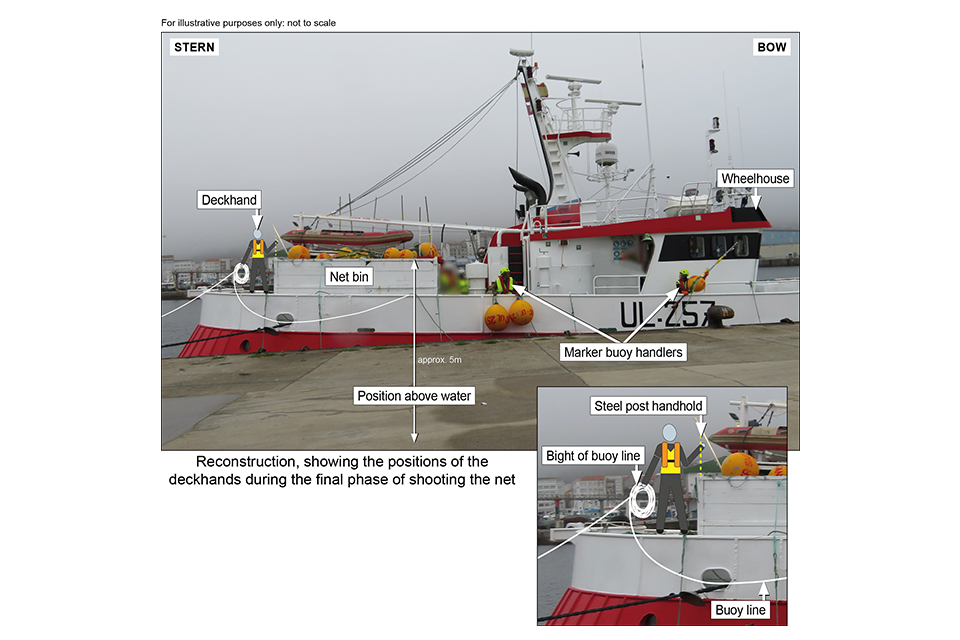Safety flyer to the fishing industry - Eder Sands
Published 8 February 2024
1. Summary
Fatal fall overboard from the fishing vessel Eder Sands (UL 257) approximately 150 nautical miles west of Ireland on 7 October 2022

2. Narrative
At about 1915[footnote 1] on 7 October 2022, a deckhand from the UK registered gill netter Eder Sands fell overboard while the vessel was shooting a net approximately 150 nautical miles west of Ireland. Despite an extensive 21-hour search involving other vessels and fixed-wing aircraft, the deckhand was not found.
The onboard procedure for shooting the final part of the fishing gear required three deckhands, one standing close to the vessel’s stern and the other two tending the net marker buoys next to the starboard wheelhouse door. All three deckhands were wearing foul weather dungarees, boots and an auto-inflate lifejacket. The deckhand at the stern was standing on the lid of a storage locker that aligned with the top of the bulwarks; he was holding on to a bight of the buoy line and might have been holding on to a steel post, which was subsequently found to have sheared off.
As the last of the net was about to be laid, the deckhand at the stern shouted to stop the vessel and call the bosun. The deckhand at the stern was seen to fall overboard 30 seconds later.
3. Safety lessons
-
The procedure for shooting nets must be included in a fishing vessel’s safety management system and properly risk assessed. Eder Sands’ crew had developed an informal routine that required one of them to stand on the lid of a storage locker close to the stern while holding a bight of buoy line. This process had not been appropriately risk assessed, resulting in no guard rails or safety harness to prevent the crew member falling overboard. Additionally, the crew were routinely handling the fishing gear when shooting the nets, putting themselves at risk of becoming entangled and dragged overboard by the gear.
-
PFDs must be worn correctly. The crew shared 10 auto-inflate lifejackets as working PFDs. However, these were routinely worn incorrectly, with the waist strap left slack so a lifejacket could be quickly put on or removed by slipping it over the wearer’s head. PFD trials conducted by the MAIB following the accident found that the wearer slipped out of the lifejacket when they entered the water with the waist strap loose, and that the inflated lifejacket would then have been quickly blown from the scene. MGN 588 (F) advises owners and skippers to prominently display onboard posters showing crew how to wear PFDs in accordance with manufacturer’s instructions. Further, it is the responsibility of owners and skippers to make sure the crew follow these instructions.
-
The capability of PFDs should match the vessel’s intended operation and working environment. Eder Sands operated independently, 24 hours a day, hundreds of miles from shore. Although compliant with the regulations, the PFDs provided had no light, crotch straps or spray hood and no automatic means to enable a crew member to be located in the water. Fishing vessel owners should fully risk assess their vessel’s operational profile to make sure that the PFDs provided to their crew for work on deck are of a suitable standard and include appropriate features to mitigate the hazards of falling overboard. Consideration should be given to the provision of lifejacket lights, crotch straps, spray hoods and personal locator beacons to help ensure the victim’s survival and their swift location and recovery.
4. Further information
Our accident investigation report is available at: https://www.gov.uk/maib-reports/fall-overboard-from-fishing-vessel-eder-sands-with-loss-of-1-life.
Extract from The United Kingdom Merchant Shipping (Accident Reporting and Investigation) Regulations 2012 – Regulation 5:
The sole objective of the investigation of an accident under the Merchant Shipping (Accident Reporting and Investigation) Regulations 2012 shall be the prevention of future accidents through the ascertainment of its causes and circumstances. It shall not be the purpose of an such investigation to determine liability nor, except so far as is necessary to achieve its objective, to apportion blame.
Note:
This safety flyer is not written with litigation in mind and, pursuant to Regulation 14(14) of the Merchant Shipping (Accident Reporting and Investigation) Regulations 2012, shall be inadmissible in any judicial proceedings whose purpose, or one of whose purposes is to attribute or apportion liability or blame.
Marine Accident Investigation Branch
First Floor, Spring Place
105 Commercial Road
Southampton
SO15 1GH
Email iso@maib.gov.uk
Enquiries during office hours +44 (0)23 8039 5500
-
Universal time coordinated. ↩

